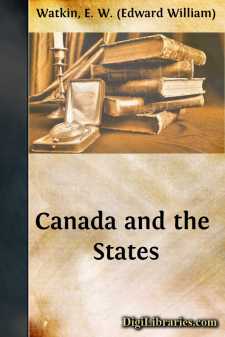Categories
- Antiques & Collectibles 13
- Architecture 36
- Art 48
- Bibles 22
- Biography & Autobiography 813
- Body, Mind & Spirit 142
- Business & Economics 28
- Children's Books 17
- Children's Fiction 14
- Computers 4
- Cooking 94
- Crafts & Hobbies 4
- Drama 346
- Education 46
- Family & Relationships 57
- Fiction 11829
- Games 19
- Gardening 17
- Health & Fitness 34
- History 1377
- House & Home 1
- Humor 147
- Juvenile Fiction 1873
- Juvenile Nonfiction 202
- Language Arts & Disciplines 88
- Law 16
- Literary Collections 686
- Literary Criticism 179
- Mathematics 13
- Medical 41
- Music 40
- Nature 179
- Non-Classifiable 1768
- Performing Arts 7
- Periodicals 1453
- Philosophy 64
- Photography 2
- Poetry 896
- Political Science 203
- Psychology 42
- Reference 154
- Religion 513
- Science 126
- Self-Help 84
- Social Science 81
- Sports & Recreation 34
- Study Aids 3
- Technology & Engineering 59
- Transportation 23
- Travel 463
- True Crime 29
Canada and the States
Description:
Excerpt
The following pages have been written at the request of many old friends, some of them co-workers in the cause of permanent British rule over the larger part of the Great Northern Continent of America.
In 1851 I visited Canada and the United States as a mere tourist, in search of health. In 1861 I went there on an anxious mission of business; and for some years afterwards I frequently crossed the Atlantic, not only during the great Civil War between the North and South, but, also, subsequent to its close. In 1875 I had to undertake another mission of responsibility to the United States. And, last year, I traversed the Dominion of Canada from Belle Isle to the Pacific. I returned home by San Francisco and the Union Pacific Railways to Chicago; and by Montreal to New York. Thence to Liverpool, in that unsurpassed steamer, the "Etruria," of the grand old Cunard line. I ended my visits to America, as I began them, as a tourist. This passage was my thirtieth crossing of the Atlantic Ocean.
Within the period from 1851 to 1886, history on the North American Continent has been a wonderful romance. Never in the older stories of the world's growth, have momentous changes been effected, and, apparently, consolidated, in so short a time, or in such rapid succession.
Regarding the United States, the slavery of four millions of the negro race is abolished for ever, and the black men vote for Presidents. A great struggle for empire—fought on gigantic measure—has been won for liberty and union. Turning to Canada, the British half of the Continent has been moulded into one great unity, and faggotted together, without the shedding of one drop of brothers' blood—and in so tame and quiet a way, that the great silent forces of Nature have to be cited, to find a parallel.
In this period, the American Continent has been spanned by three main routes of iron-road, uniting the Atlantic and Pacific Oceans: and one of these main routes passes exclusively through British territory—the Dominion of Canada. The problem of a "North-west Passage" has been solved in a new and better way. It is no longer a question of threading dark and dismal seas within the limits of Arctic ice and snow, doubtful to find, and impossible, if found, to navigate. Now, the two oceans are reached by land, and a fortnight suffices for the conveyance of our people from London or Liverpool to or from the great Pacific, on the way to the great East.
Anyone who reads what follows will learn that I am an Imperialist—that I hate little-Englandism. That, so far as my puny forces would go, I struggled for the union of the Canadian Provinces, in order that they might be retained under the sway of the best form of government—a limited monarchy, and under the best government of that form—the beneficent rule of our Queen Victoria. I like to say our Queen: for no sovereign ever identified herself in heart and feeling, in anxiety and personal sacrifice, with a free and grateful people more thoroughly than she has done, all along.
In this period of thirty-six years the British American Provinces have been, more than once, on the slide. The abolition of the old Colonial policy of trade was a great wrench....


